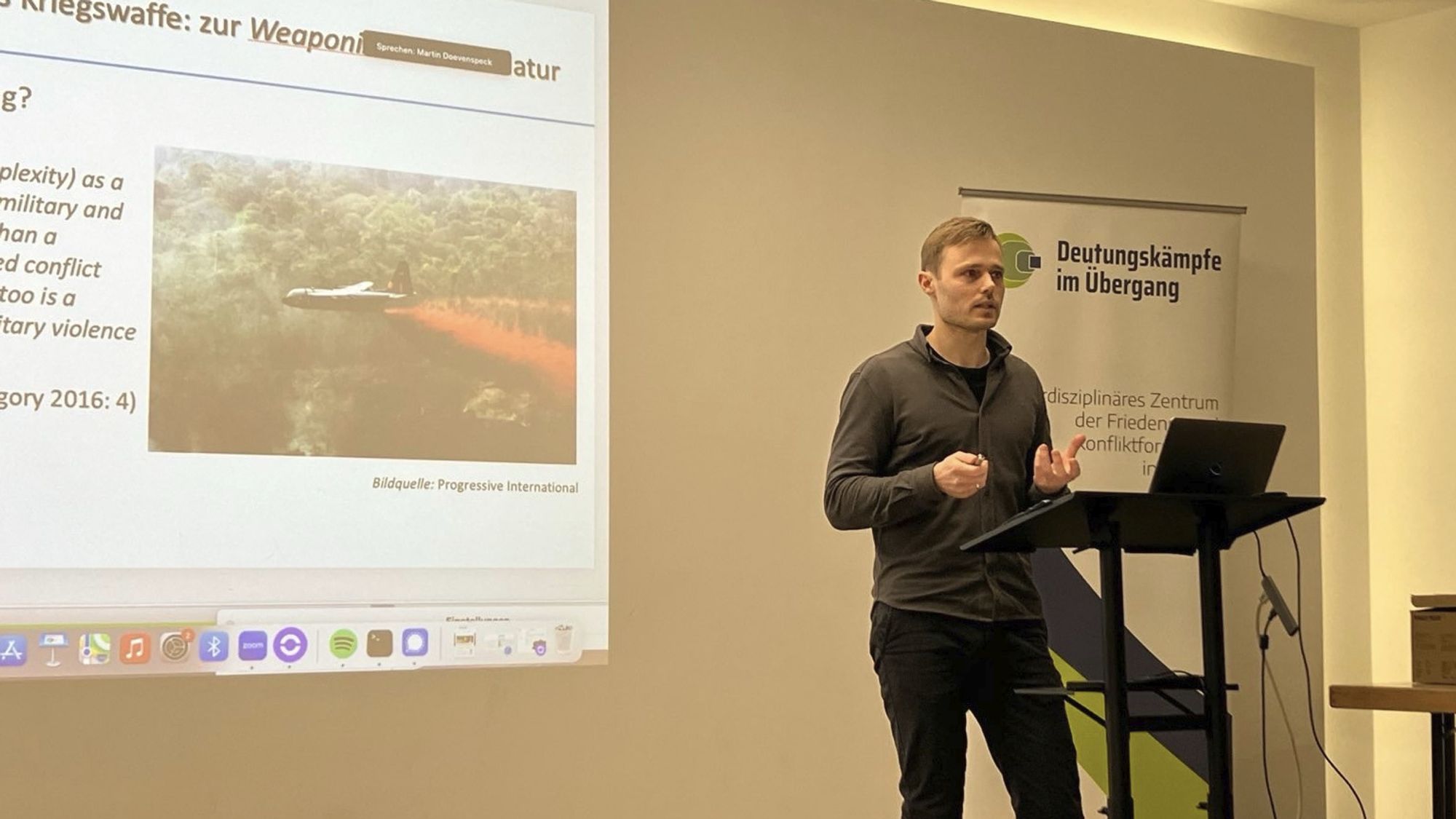News
„Wars and their environmental impacts“ – Talk by Prof. Benno Fladvad
Report by Rachel Owusu & Jan Sändig
In view of the fighting in Ukraine, including the destruction of the Kachovka dam, an often neglected but highly relevant topic has recently become more prominent in the public consciousness: The environmental consequences of war. Of particular interest here is the role that the environment can and should play in peace policy.
Prof. Benno Fladvad from the Institute of Geography at the University of Hamburg spoke on this topic on 23.1.2024 in the "Bayreuth Peace Talks" series. The event was also part of the lecture series "Spaces of War" of the Department of Geography at the University of Bayreuth, organized by Prof. Martin Doevenspeck. PD Dr. Florian P. Kühn moderated the lecture evening.
The "Bayreuth Peace Talks" are part of the activities of the Chair of Sociology of Africa within the framework of the new UBT Network for Peace and Conflict Research. In this series of events, guests from academia, politics and society shed light on the causes and contexts of political conflicts as well as possibilities for peacebuilding.
Lecture
In his lecture, Benno Fladvad addressed the interaction between ecology and peace policy in the age of the Anthropocene. The focus was on a planetary perspective that emphasizes the interactions between social, ecological and geological dynamics and goes beyond human time scales. The two world wars and the development of nuclear weapons were significant steps towards the Anthropocene, in which humans have become the decisive factor for the environment and climate. This was first noted by natural scientists in particular with regard to nuclear weapons tests in the Pacific, which made parts of the Marshall Islands uninhabitable.
These 20th century wars have left numerous legacies. An estimated 1.5 million tons of conventional munitions and 5,000 tons of chemical warfare agents are stored in the North and Baltic Seas alone. Environmental warfare even involves deliberately destroying the environment to achieve military objectives, for example by bombarding forests, farmland and water infrastructure.
Since wars always have an ecological impact, environmental and peace initiatives must be closely linked
Warfare has also become a significant factor in climate change. The military causes approximately 5.5% of global CO2 emissions per year.
At the same time, military interventions are linked to the maintenance of social models based on fossil fuels.However, climate protection measures, including the expansion of renewable energies, also lead to conflicts.
The environmental consequences of the war against Ukraine are also clear: it is estimated that 440,000 hectares of natural landscapes and 20% of nature reserves have been destroyed so far. At the same time, far-reaching global effects are being felt, including delays in grain deliveries, which is affecting global food security, and rising fertilizer prices.
In conclusion, Benno Fladvad argued that a political understanding is needed that wars always have an ecological impact - in short, it is a matter of closely linking environmental and peace initiatives.
Discussion
The ensuing discussion initially focused on historical examples of environmental warfare.
Benno Fladvad pointed to the spread of pathogens by colonial powers, which killed large parts of the indigenous population of South America. The question of the legal options for prosecuting environmental crimes was also raised.Here, Benno Fladvad observes a political momentum in Europe to legally enshrine "ecocide" as a crime, particularly as a result of the destruction of the Kachowka Dam. In the field of legal geography, Benno Fladvad also sees opportunities for geographers to generate relevant knowledge for such legal action.Finally, the discussion focused on how an environmentally-oriented peace movement can gain influence in the political arena when there is no end in sight to the fighting in Ukraine and armament has become the political consensus. In this context, Benno Fladvad was critical of ongoing efforts towards "green armament" and "green weapons", which he sees as inherently contradictory.

